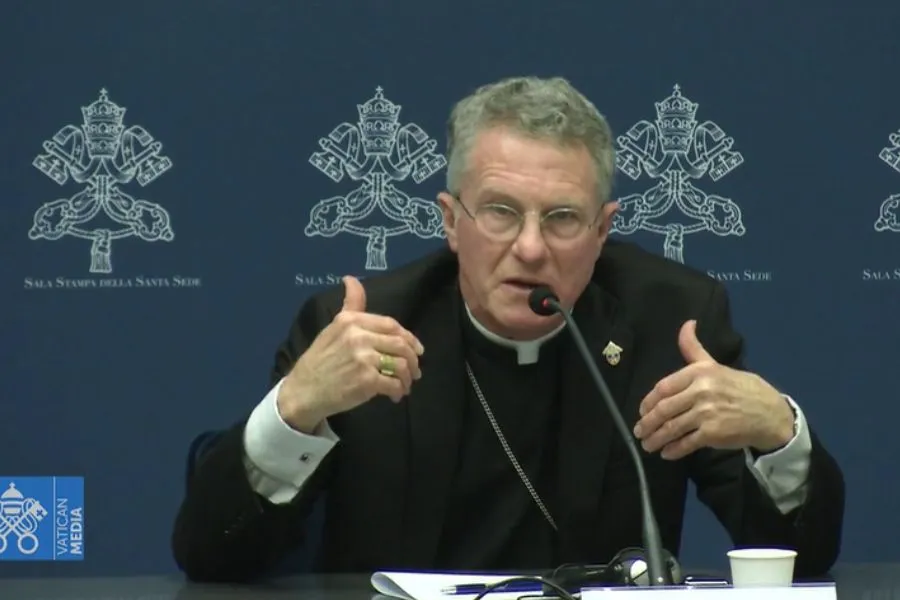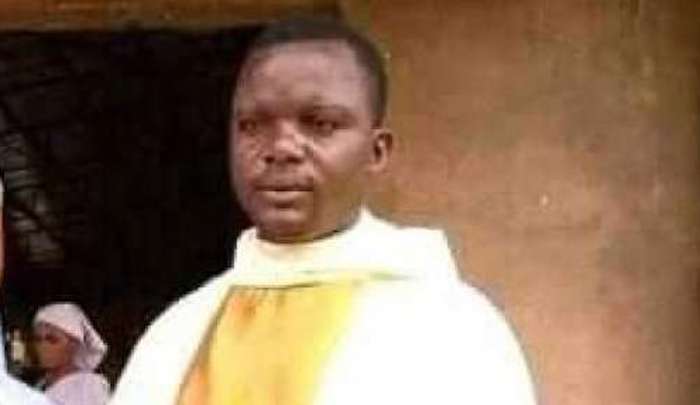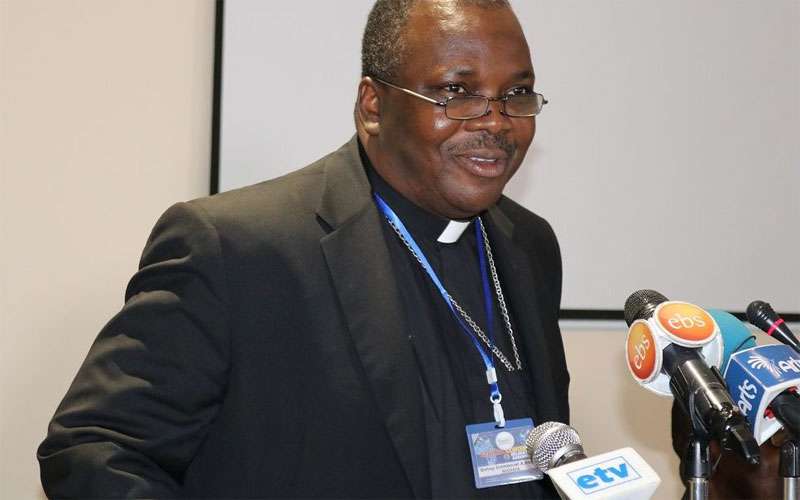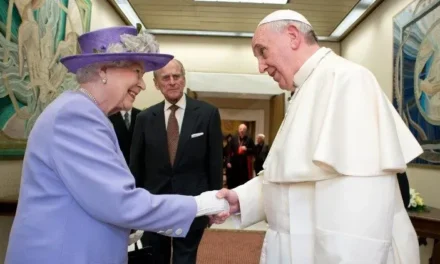É interessante notar que, pela primeira vez na história do mundo, a América concorda com a perspectiva africana. Delegado americano no Sínodo sobre Sinodalidade compartilha “Sabedoria Africana” sobre a Guerra
O Arcebispo Timothy Paul Broglio, presidente da Conferência dos Bispos Católicos dos EUA (USCCB), que participa no Sínodo sobre a Sinodalidade, de 4 a 29 de outubro, em Roma, relembrou o serviço prestado na Costa do Marfim e a lição que aprendeu em África sobre a guerra.
Partilhando a sua experiência do Sínodo no briefing de quarta-feira, 25 de Outubro, em Roma, o Arcebispo Broglio disse que muito poderia ser aprendido com o que ele descreveu como “sabedoria africana” na resolução de conflitos mundiais.
“Se eu puder recorrer a um pouco da sabedoria africana”, disse ele, acrescentando que em África tinha ouvido dizer que “depois que as pessoas lutam numa guerra, sentam-se e discutem termos de paz” e “não seria seria melhor se eles se sentassem primeiro e discutissem antes de irem para a guerra?” O natural de Cleveland, Ohio, que serve como Ordinário Local dos Serviços Militares dos EUA, admitiu que considerou a noção africana de guerra e paz “muito sábia”.
O Arcebispo Broglio serviu como Secretário da Nunciatura Apostólica em Abidjan, Costa do Marfim, entre 1983 e 1987, antes de assumir outras funções na liderança da Igreja, incluindo Núncio Apostólico na República Dominicana e Delegado Apostólico em Porto Rico.
Durante a estadia do Arcebispo Broglio na Costa do Marfim, o país da África Ocidental foi exemplarmente pacífico e foi considerado o “modelo de estabilidade” do continente. Isto foi antes de 2002, quando uma rebelião armada mergulhou o país numa turbulência que durou mais de quatro anos. A segunda fase de violência no país foi testemunhada durante cinco meses entre 2010-2011. Na conferência de imprensa do delegado do Sínodo, o Arcebispo Broglio falou após a apresentação do Cardeal Dieudonné Nzapalainga, Arcebispo de Bangui na República Centro-Africana (RCA), que falou sobre o envolvimento da Igreja na RCA na restauração da paz no país africano. “Compartilho o entusiasmo do Cardeal pela paz”, disse o Arcebispo Broglio em referência à apresentação do Cardeal Nzapalainga, e acrescentou: “Se há algo que aprendi nos últimos quinze anos, é que os militares têm o maior desejo de paz”.
“Na minha experiência com os militares dos EUA em quase 20 anos de guerra, eles reconhecem o que é a guerra e o que representa o custo. Então, talvez também a escuta no intercâmbio que está acontecendo no Sínodo possa fornecer um exemplo para o mundo ver e talvez imitar na resolução de conflitos mundiais”, disse o Arcebispo de 71 anos. O Cardeal Nzapalainga narrou o envolvimento da Igreja na restauração da paz na RCA, que está em conflito desde a independência do país em 1960.
“Venho de um país afetado pela guerra”, disse o membro de 56 anos da Congregação do Espírito Santo sob a proteção do Coração Imaculado de Maria (C.S.Sp.), também conhecidos como Espiritanos ou Padres do Espírito Santo. com outros participantes no Sínodo sobre a Sinodalidade.
“Quando houve guerra, protestantes e católicos reuniram-se para falar com os rebeldes e pedir-lhes que parassem e pensassem no interesse do país. O Papa Francisco veio nos visitar em 2015 para a abertura da Porta Santa, momento que foi muito importante na RCA. Entendemos que foi iniciado um caminho para o qual todos nós tínhamos que contribuir”, afirmou.
O Cardeal Nzapalainga, que também disse, durante a conferência de imprensa de 25 de Outubro, que as mulheres na RCA desempenham um papel significativo nos assuntos da Igreja no país, partilhou que uma situação de guerra, sofrimento e migração persiste na RCA, mesmo na altura do Sínodo sobre a Sinodalidade, e acrescentou: “Viemos aqui para partilhar tudo isto com os nossos irmãos”.
Il est intéressant de noter que pour la première fois dans l’histoire du monde, l’Amérique partage la perspective africaine. Un délégué américain au Synode sur la synodalité partage la « sagesse africaine » sur la guerre
L’archevêque Timothy Paul Broglio, président de la Conférence des évêques catholiques des États-Unis (USCCB), qui participe au synode sur la synodalité du 4 au 29 octobre à Rome, a rappelé son service en Côte d’Ivoire et la leçon qu’il a apprise en Afrique sur la guerre.
Partageant son expérience du Synode lors de la réunion d’information du mercredi 25 octobre à Rome, Mgr Broglio a déclaré que beaucoup de choses pourraient être apprises de ce qu’il a décrit comme la « sagesse africaine » dans la résolution des conflits mondiaux.
« Si je peux m’appuyer sur un peu de sagesse africaine », a-t-il dit, ajoutant qu’en Afrique, il avait entendu dire qu’« après une guerre, les gens s’assoient et discutent des termes de la paix » et « ne serait-il pas Ce serait mieux s’ils s’asseyaient d’abord et discutaient avant de partir en guerre ? Le natif de Cleveland, Ohio, qui est l’Ordinaire local des services militaires américains, a admis qu’il trouvait la notion africaine de guerre et de paix « très sage ».
L’archevêque Broglio a été secrétaire de la nonciature apostolique à Abidjan, en Côte d’Ivoire, entre 1983 et 1987 avant d’assumer d’autres fonctions dans la direction de l’Église, notamment celles de nonce apostolique en République dominicaine et de délégué apostolique à Porto Rico.
Lors du séjour de Mgr Broglio en Côte d’Ivoire, ce pays d’Afrique de l’Ouest était exemplaire en termes de paix et était considéré comme le « modèle de stabilité » du continent. C’était avant 2002, lorsqu’une rébellion armée a plongé le pays dans une tourmente qui a duré plus de quatre ans. La deuxième vague de violence dans le pays a duré cinq mois, entre 2010 et 2011. Lors de la conférence de presse du délégué au Synode, Mgr Broglio a pris la parole après la présentation du cardinal Dieudonné Nzapalainga, archevêque de Bangui en République centrafricaine (RCA), qui a parlé de l’implication de l’Église en RCA dans le rétablissement de la paix dans ce pays africain. « Je partage l’enthousiasme du cardinal pour la paix », a déclaré Mgr Broglio en référence à la présentation du cardinal Nzapalainga, et a ajouté : « S’il y a quelque chose que j’ai appris au cours des quinze dernières années, c’est que les militaires ont le plus grand désir de paix ».
« D’après mon expérience avec l’armée américaine au cours de près de 20 ans de guerre, ils reconnaissent ce qu’est la guerre et quel en est le coût. Alors peut-être que l’écoute des échanges qui ont lieu au synode pourrait également fournir au monde un exemple à voir et peut-être à imiter dans la résolution des conflits mondiaux », a déclaré l’archevêque de 71 ans. Le cardinal Nzapalainga a relaté l’implication de l’Église dans le rétablissement de la paix en RCA, en conflit depuis l’indépendance du pays en 1960.
« Je viens d’un pays touché par la guerre », a déclaré le membre de la Congrégation du Saint-Esprit sous la protection du Cœur Immaculé de Marie (C.S.Sp.), également connu sous le nom de Spiritains ou Pères du Saint-Esprit, âgé de 56 ans avec d’autres participants au Synode sur la Synodalité.
« Lorsqu’il y avait la guerre, protestants et catholiques se réunissaient pour parler avec les rebelles et leur demander d’arrêter et de réfléchir à l’intérêt du pays. Le Pape François est venu nous rendre visite en 2015 pour l’ouverture de la Porte Sainte, un moment très important en RCA. Nous avons compris qu’un chemin avait été ouvert auquel nous devions tous contribuer », a-t-il déclaré.
Le Cardinal Nzapalainga, qui a également déclaré, lors de la conférence de presse du 25 octobre, que les femmes centrafricaines jouent un rôle important dans les affaires de l’Église du pays, a partagé qu’une situation de guerre, de souffrance et de migration persiste en RCA, même à l’époque. du Synode sur la Synodalité et a ajouté : « Nous sommes venus ici pour partager tout cela avec nos frères ».
It is interesting to note that for the first time in the history of the world, America agrees with the African perspective. American Delegate at Synod on Synodality Shares “African Wisdom” on War
Archbishop Timothy Paul Broglio, the president of the U.S. Conference of Catholic Bishops (USCCB) who is participating in the October 4-29 Synod on Synodality in Rome has reminisced about serving in Ivory Coast, and the lesson he learned in Africa about war.
Sharing his experience of the Synod at the Wednesday, October 25 briefing in Rome, Archbishop Broglio said that a lot could be learned from what he described as “African wisdom” in resolving world conflict.
“If I can draw on a little bit of African wisdom,” he said, adding that in Africa, he had heard it said that “after people fight a war, they sit down and discuss terms of peace” and “wouldn’t it be better if they sat down first and discussed before they went to war?” The native of Cleveland, Ohio, who serves as the Local Ordinary of the U.S. Military Services admitted that he found the African notion of war and peace “very wise”.
Archbishop Broglio served as the Secretary of the Apostolic Nunciature in Abidjan, Ivory Coast, between 1983 and 1987 before he took up other roles in the leadership of the Church, including Apostolic Nuncio in the Dominican Republic and Apostolic Delegate to Puerto Rico.
During Archbishop Broglio’s stay in Ivory Coast, the West African country was exemplarily peaceful and was regarded as the continent’s “model of stability”. This was before 2002 when an armed rebellion plunged the country into turmoil that lasted for over four years. The country’s second stretch of violence was witnessed for five months between 2010-2011. At the Synod delegate’s press briefing, Archbishop Broglio spoke after the presentation of Dieudonné Cardinal Nzapalainga, Archbishop of Bangui in Central African Republic (CAR), who shared about the involvement of the Church in CAR in restoring peace in the African country. “I share the Cardinal’s enthusiasm for peace,” Archbishop Broglio said in reference to Cardinal Nzapalainga’s presentation, and added, “If there is anything I have learnt in the last fifteen years, it is that the military has the greatest desire for peace.”
“In my experience with the U.S. military in almost 20 years of war, they recognize what war is and what cost represents. So perhaps also the listening in the exchange that is going on in the synod might provide an example for the world to see and perhaps to imitate in resolving world conflict,” the 71-year-old Archbishop said. Cardinal Nzapalainga narrated the Church’s involvement in restoring peace in CAR, which has been in conflict since the country’s independence in 1960.
“I come from a country affected by war,” the 56-year-old member of the Congregation of the Holy Spirit under the protection of the Immaculate Heart of Mary (C.S.Sp.), also known as Spiritans or Holy Ghost Fathers, shared with other participants in the Synod on Synodality.
“When there was war, Protestants and Catholics came together to speak with the rebels to ask them to stop and to think about the interest of the country. Pope Francis came to visit us in 2015 for the opening of the Holy Door, a moment that was very important in CAR. We understood that a path had been started to which all of us had to contribute,” he said.
Cardinal Nzapalainga, who also said, during the October 25 press briefing, that women in CAR play a significant role in the affairs of the Church in the country shared that a situation of war, suffering, and migration persists in CAR, even at the time of the Synod on Synodality, and added, “We came here to share all these with our brothers.”
- CATHOLIC ARCHBISHOP IN GHANA HAILS POPE LEO XIV AS GOD’S GIFT - 23 mai 2025
- POPE LEO XIV TO APPROVE CANONIZATIONS - 22 mai 2025
- THE EVOLUTION OF PAPAL TRANSPORTATION - 20 mai 2025







